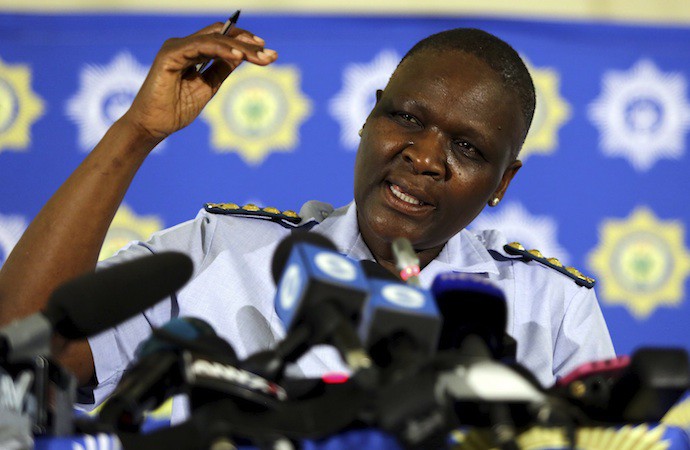The murder rate has increased despite overall serious crime declining slightly by 0.4 percent, according to the 2013/2014 crime statistics released on Friday.
“It’s a very difficult area to police. It requires each and every one of us to work together,” national police commissioner Riah Phiyega said referring to the murder rate.
“We really need help in this area.”
She said abuse was often not reported and by the time police were called a murder had already been committed.
Phiyega said most murders were committed by someone known to the victim.
She was announcing the crime statistics for the past financial year at the SA Police Service Tshwane Training Academy in Pretoria.
Murder had increased by five percent and attempted murder by 4.6 percent.
The murder rate increased in the Western Cape, Northern Cape, Gauteng, Eastern Cape, and Limpopo, but dropped in the North West, Free State, Mpumalanga, and KwaZulu-Natal.
Police Minister Nkosinathi Nhleko said the statistics were based on raw figures of cases reported.
Community-reported crimes made up of 84.1 percent, while police-detected crime was 15.9 percent.
Phiyega announced that contact crimes had increased by 0.5 percent.
Contact crimes included murder, attempted murder, assault with intent to do grievous bodily harm, and common assault.
Attempted murder increased by 4.6 percent, assault with intent to do grievous bodily harm dropped by 1.5 percent, and common assault dropped by 3.3 percent.
Phiyega said rape and sexual assault had dropped.
Rape showed a 6.3 percent decrease and sexual assault a 4.9 percent drop, while total sexual offences decreased by 5.6 percent.
“We are not going to rest. We will continue putting effort into these areas,” she said.
Robbery with aggravating circumstances increased by 12.7 percent.
The largest increase was in bank robberies, where there was a 200 percent rise.
“Bank robbery went from seven to 21, with Gauteng contributing most of them,” Phiyega said.
Gauteng had 11 bank robberies, the Eastern Cape five, KwaZulu-Natal two, and the Free State three.
She said bank robberies were largely organised and associated with syndicates, which needed intelligence-led policing.
Cash-in-transit robberies stabilised and common robbery increased by 0.6 percent.
Phiyega said contact-related crimes decreased overall by 1.3 percent.
All provinces had contributed positively, except for the Western Cape and Eastern Cape.
Contact-related crimes include arson and malicious damage to property.
Arson dropped by 4.2 percent and malicious damage to property went down by 1.1 percent.
Property-related crimes saw an overall drop of 0.2 percent.
Housebreaking at other premises decreased by 0.04 percent, residential housebreaking decreased by 0.6 percent, theft of motor vehicles decreased by 2.6 percent, theft out of motor vehicles increased by 3.0 percent, and stock theft dropped by 6.2 percent.
According to Phiyega, commercial crime decreased by 13.6 percent.
The Northern Cape was the only province to increase its rate of commercial crime, she said.
Crime detected as a result of police action increased by 18.2 percent.
Illegal possession of firearms and ammunition increased by 3.7 percent, drug-related crime increased by 26.1 percent, and driving under the influence of alcohol or drugs decreased by 1.8 percent.
Phiyega announced there were 1907 violent protests in 2013/14 and 11,601 peaceful protests.
The most protests were in Gauteng, followed by the Eastern Cape, she said.
The so-called trio crimes had increased by 10.8 percent.
Trio crimes are crimes relating to personal safety and business, such as house robbery, business robbery, and carjacking.
In the past financial year, carjacking saw a 12.3 percent increase, truck hijacking a 12.1 percent increase, robbery a 13.7 percent increase, and robbery in residential areas a 7.4 percent increase, said Phiyega.
“Trio crimes are packaged differently because Cabinet is keen to know how these are doing,” Phiyega said.
Of the 1.7 million people arrested for crime, Phiyega said 762 were police officers.
“We do arrest police and as we do so internally we run our own disciplinary processes and we do dismiss them,” she said. SAPA






 WhatsApp us
WhatsApp us 

